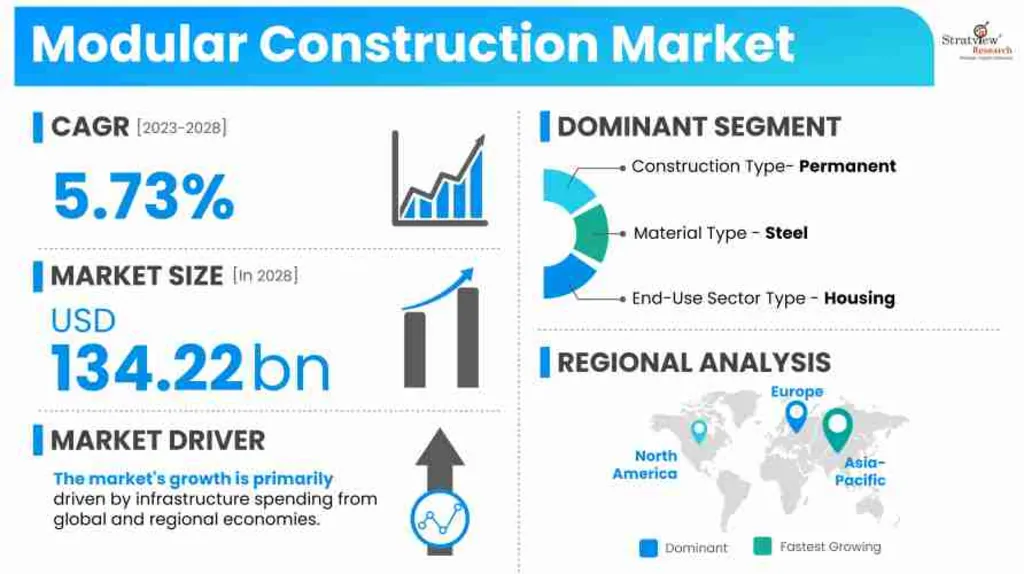Southeast Asia is experiencing a surge in modular construction, transforming the way buildings are designed and developed. With urban populations rising and infrastructure demands growing, modular techniques offer a cost-effective, fast, and sustainable solution for housing, commercial, and industrial projects. The Asia-Pacific modular construction market was valued at USD 38.72 billion in 2023 and is expected to reach USD 58.07 billion by 2029, growing at a CAGR of 6.83%. This growth reflects the increasing demand for efficient and scalable construction methods. Thus, Modular Construction in Southeast Asia is being adopted more and more.

Why Modular Construction in Southeast Asia is Gaining Popularity
Several factors are driving the adoption of modular construction in Southeast Asia:
- Rapid Urbanization: The region’s population growth requires faster housing and infrastructure solutions.
- Government Support: Countries like Indonesia and Vietnam are promoting modular construction to address housing shortages.
- Market Expansion: The industry is expected to grow at a CAGR of 7.08%, reaching USD 58.18 billion by 2032.
By integrating modular techniques, developers can meet housing demands faster while ensuring high-quality and eco-friendly construction.
Key Benefits of Modular Construction in Southeast Asia
Cost Efficiency
Traditional construction methods can be expensive due to labor costs, material waste, and project delays. Modular construction, on the other hand, reduces costs by 20-30%, making it an attractive option for developers and governments.Faster Project Completion
Time is a critical factor in construction. Modular methods allow for simultaneous off-site fabrication and on-site assembly, reducing build times significantly. This method enables developers to complete projects 30-50% faster than conventional construction.Sustainability and Waste Reduction
Sustainability is a growing concern in Southeast Asia. Modular construction generates less waste, consumes fewer resources, and emits lower carbon emissions compared to traditional methods. As countries push for green building initiatives, modular techniques align with global sustainability goals.
Government Initiatives Supporting Modular Construction
Governments across Southeast Asia are investing in modular construction to improve housing and infrastructure. Key initiatives include:
- Indonesia’s Capital City Project: Modular construction is being explored to accelerate the development of Indonesia’s new capital.
- Vietnam’s Affordable Housing Plans: The government is promoting modular solutions to meet urban housing demands.
- Singapore’s Prefabricated Prefinished Volumetric Construction (PPVC) Initiative: A leading example of modular construction, reducing on-site work and boosting efficiency.
These policies are expected to increase adoption rates, making modular construction a standard practice in the region.
Overcoming Challenges
Despite its benefits, modular construction faces obstacles:
- High Initial Investment: The cost of setting up modular production facilities can be high.
- Design Limitations: Modular units require careful planning to ensure flexibility and customization.
- Industry Awareness: Many developers are still unfamiliar with modular technology and its advantages.
However, as demand for cost-effective and sustainable building solutions grows, modular construction is poised to become a mainstream solution.
The Future of Modular Construction in Southeast Asia
With rising urban populations, government support, and increasing sustainability goals, modular construction is set to transform Southeast Asia’s building industry. The market’s projected growth highlights the shift toward faster, cheaper, and greener construction solutions. By embracing Modular Construction in Southeast Asia, the region can improve housing affordability, reduce environmental impact, and accelerate infrastructure development. All in all, it will help shaping the future of urban landscapes.






